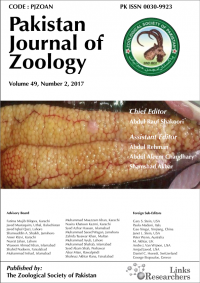Co-Treatment of Caffeic Acid Phenethyl Ester with Chitosan Nanoparticles Inhibits DNA Methylation in HepG2 Cells
Co-Treatment of Caffeic Acid Phenethyl Ester with Chitosan Nanoparticles Inhibits DNA Methylation in HepG2 Cells
Faisal Alzahani1* and Mohammed Abu El-Magd2*
ABSTRACT
Caffeic acid phenethyl ester (CAPE) is a key anticancer component of honeybees propolis (bee glue), however, its anticancer effect is limited due to its rapid degradation into caffeic acid. To get rid of this disadvantage and increase the anticancer effect of CAPE, CAPE-loaded chitosan nanoparticles (CNPs) were used. The anti-tumor effects of CAPE and chitosan CNPs on cancer cells have been separately studied but the precise epigenetic molecular mechanisms for the combined therapy are still unclear. This study aimed to investigate the epigenetic mechanism of CAPE and/or CNPs on human HepG2 cells. The results revealed a significantly higher cytotoxic effect for CAPE on HepG2 cells than CNPs. The combined therapy with CAPE and CNPs exhibited significantly higher expression of the apoptotic Bax gene and lower expression of the antiapoptotic Bcl2 gene than treatment with each alone. CAPE and CNPs co-treatment also inhibited global DNA methylation levels and downregulated the expression of DNA methylation-related genes (DNMT1 and Ube2e2) in HepG2 compared to cells treated with CAPE and CNPs each alone. These findings conclude that the cytotoxic impact of CAPE and CNPs combined therapy on HepG2 cells involved an epigenetic effect.
To share on other social networks, click on any share button. What are these?










